I lost my arm in a zoo. That’s what she tells them when they stare with bewildered eyes, and turn their faces away at the sight of her empty left sleeve, which suspended in time, holds nothing but air. She looks out for the shock, almost invites it as her neighbors pass her in the courtyard, as they observe from their balconies, pretending to not look. Not ready to answer her neighbors’ questions, she keeps to herself, only coming out onto her balcony when the children from the surrounding apartments come out to play.
They come out after school and on weekends, onto the green courtyard around which five blocks of apartments stand in a horseshoe. They sit on the grass and chase one another until dizziness overcomes them. They dress up their dolls, throw a ball around, until their mothers and older sisters walk onto their balconies to call them back inside. Calls that elicit acquiescence from the obedient ones and groans from the ones who say “I’m coming,” but only move when an irritated mother shows up again wielding a threatening finger.
Lately, her trips onto her balcony have become focused on a little boy called Mpho. He showed up on the balcony of the topmost apartment in the block adjacent to hers on a day the rain kept the children inside. He had been watching her as she drifted in and out of sleep on her balcony. Intrigued by his staring, she opened her eyes to meet his. He waved when he saw her notice him. Tentatively at first, then more vigorously when her eyes remained focused on his small face inserted between the squares of the guardrails. A response began to form in the back of her throat. But she took too long, for his head pulled back to gaze at the sliding door behind him at the same time as she heard a woman’s voice. “Mpho.” The little one scurried back inside as the voice called again, “Mpho, come here.”
One afternoon, she leaves her balcony to sit on a bench in the courtyard. Mpho is playing football with a group of boys. The wind carries their shouts of “shoot,” “pass,” and “goal” from the middle of the courtyard to her bench, so it seems she’s part of their game. And she is, for the ball soon shoots through the air towards her. She gets up to pick up the ball as Mpho runs over. She hands the ball to him. “Who’s winning?” she asks.
“My team!” he cries out, before dashing back to his friends.
She studies Mpho in awe. Her little miracle with boundless energy, who kicks with short stubby legs, who smiles even when the ball falls short of the other team’s goalpost. This is what it feels like to see life coursing through every step and every shout. She watches in awe until dusk comes and halts the games for the day.
Back in her apartment, she takes out the box of baby clothes from the wardrobe in the second bedroom. Several onesies, tops, and bibs. Neutral colors because she hadn’t wanted to know the sex of the baby. This is not the first time she has contemplated throwing the box away. Once, she went as far as pulling the box towards the front door. But keys in hand, the door ajar, the security gate left to be unlocked, she stopped. Although the baby never wore the clothes, she couldn’t help but see lasting traces of his soul in them—the little bits of a person, the smells, and fingerprints we stamp on our belongings and leave behind when we die.
She selected each item of clothing carefully, imagined little arms in sleeves, and little feet in socks. Her due date pending, she washed the clothes to remove the touch of factory hands.
Now, she pulls the box into her room. Slowly, she folds the clothes into neat little shapes, and arranges them on an empty shelf in her wardrobe.
She smiles more often. Particularly when she sees Mpho. Laughter abounds around her and in her. She grows accustomed to a routine with Mpho as the constant figure. She takes her eyes off Mpho once, twice, certain in his continuous presence.
But he is not there in the courtyard when she looks again. She doesn’t see him the next day either. She decides to search for him.
She doesn’t know what she’ll say to Mpho’s parents when she gets to the apartment in the block next to hers. She simply allows her anxiety to propel her up the stairs. But when she reaches the set of stairs just below what must be Mpho’s family’s apartment, the force behind her gives way to a destabilizing fear. She misses a step. Her body bends over. Her phantom left hand stretches out to grab hold of the cream-colored wall. She steadies herself. But only for a second. She falls.
On her way back to her apartment, she considers the absence on the left side of her body, the things that this lack prevents her from doing. She can no longer care for a baby without help. She will struggle to change and bathe one. Yet she still wants a child.
Days go by without her seeing Mpho, so that darkness overwhelms her. She hides under a blanket, and ignores the clouded view of the Johannesburg skyline visible from her bedroom window. She sees not the jagged crack of lightning that saws the skyline in half: on one side, the high-rises in the city centre; on the other side, the yellow ash of the Soweto mine dumps. Her days drag on.
Eventually, Mpho returns. From a trip outside of Jo’burg, it seems. Through her bedroom window she watches them in the parking lot: Father removing suitcases from the boot; Mpho helping his little sister with their toys; Mother directing it all. The complete family.
Bile rises in her throat. She runs to the bathroom and releases nothing from her empty stomach. All the same she sees vomit in the toilet bowl, dregs of the healthy breakfasts she made for herself during her pregnancy.
She turned to IVF after a third round of artificial insemination proved unsuccessful. “Probably due to age,” her doctor had said, as he reminded her of the success rates of differently aged women—the science of the body that was unresponsive to her prayers. His reasoning fueled her. Once again she selected a sperm donor from a range of profiles: tall, short, black, white, Indian, colored. The invented family. She imagined men jerking off in little rooms, their eyes trained on glossy magazine paper imprinted with images of naked women. The romance of making a family, she thought.
For more than a week she injected herself with hormones for her body to develop more eggs than usual. She checked in with her doctor every other day. On her fourth visit, she heard her doctor say he was happy with the progress in her ovaries. It was time for the eggs to be harvested.
She acknowledged the news with a curt nod. In an attempt to remain detached from the hope buried deep inside her stomach, she had placed herself in a bubble fortified with concrete. The bubble kept her sedate, so it was in a flat voice that she asked her doctor when her eggs would be harvested.
“As soon as possible. Can you do tomorrow or the day after?”
Her mind’s eye scanned her calendar. A couple of staff meetings she could skip. She told the doctor to book her in immediately.
At work the day after the retrieval, she retreated into a small conference room, looking to avoid meetings and the mindless chatter of her colleagues. Yet she was unable to concentrate on the documents populating her computer screen. Within her bubble she marvelled that in a hospital not far from her office in Sandton, the sperm of a faceless man were latching onto her eggs, piercing them to form life. She felt cheated. A petri dish was doing what her body would not do: bringing the crucial ingredients together, forming a living thing.
Following her instructions, her doctor transferred three embryos into her uterus. She felt a new weight in her womb after the transfer, and although her doctor told her she could go to work the following morning, she spent a week in bed, her legs bound in stirrups to keep her child wedged inside. She didn’t think the hour she spent lying on her back at the hospital had been enough.
She was rewarded. Her pregnancy test came up positive.
She heard nothing else after her doctor gave her the news. The bubble had burst. She was walking on water, embracing the months ahead. The joy. The thrill of seeing her stomach swell up. The swollen ankles. The planning. She was mute with overwhelming pleasure. She felt complete.
She waited four months before telling her sister. On a Skype call to the US, she lifted her body from her sofa to show her sister her bump. A proud look stretched the sides of her mouth. “It’s grown, eh,” her sister said, and she nodded and kept smiling.
“So how are you? I hope your morning sickness is over. When I had Aseda, it continued into my fifth month. Can you imagine? With Yaw it was better. Maybe it’s because Aseda was my first. How time flies. You’ll see. They grow so fast. I mean look at Aseda. She’s now ten and Yaw almost seven. Time flies. And then they start walking and talking and doing all sorts of things.”
She was happy to sit there, her hands cradling her stomach, as her sister carried on about her children’s exploits and about her husband, whose medical practice was doing well. In the rectangular frame of her computer screen, she watched her sister stick her head into a massive silver fridge. A minute later, her sister walked out of the frame, in her hand a tub of tomato puree. She heard drawers being pulled open and the rush of water gushing out of a tap. Then the clinking of metal against glass and the sizzling sound of food being fried. “I’m making jollof,” her sister’s voice reached her in explanation.
Her sister reappeared on the screen. “Have you told Mom?” She hesitated. “Not yet.”
“I know you find her a bit much. But she can help.”
“I’ll be fine.”
“Trust you to say that. How will you cope?” A question her mother would ask. “I mean Patrick can be useless sometimes, but at least he can occupy the kids when my hands are full. I’m telling you. It’s not easy ooo. It helps to have another pair of hands, even if it’s a man’s.”
She felt a jab. “Well, I don’t have a choice. I’ll make do.”
Her sister’s face set into a familiar expression of mock confusion. “Really. I think you could have had any of them. I mean Kwame was practically ready to do anything for you, and then you let that Sena girl have him. And then Steve. I mean you guys were living together at one point.”
She had stopped listening. Her sister’s words were like pinpricks, incisions on her skin. They opened seemingly healed wounds. For what she wouldn’t admit was that her sister’s questions were also her questions. She recoiled into her shell as her sister’s inquisition continued. When she came to, it was to her sister saying, “I’m just saying. You were so popular at Wits. What happened?”
She shrugged.
Her sister in the US and her mother in Umtata, all the way in the Eastern Cape, she attended antenatal classes sometimes with friends, sometimes without friends. With the numbness that was her armor, she ignored the smug looks from pregnant wives when she showed up alone. She resembled the good student she’d been all her life in a class on how to breathe during labour and another class on how to hold and breastfeed a newborn.
Forty weeks of check-ups and of planning. Then the waiting ended.
Her mother was with her after all at the end. “I guess we live in a different world,” her mother had said, when she called Umtata to let her know a month before her due date. And despite the hidden meanings and possible interpretations of her words, her mother was standing by her side in the delivery room, offering her hand to be squeezed when contractions consumed her daughter.
Her mother only let go when she was rushed to the operating room for an emergency C-section.
And when she emerged from the operation, her mother was the one there to tell her with pain in her eyes that there was no child to hold. Only the phrase “complications during surgery” floating above her, weighing on the raw skin of her person.
Mpho. Meaning gift. A Sotho word not in her vocabulary, but one that makes sense the afternoon following Mpho’s return, when a ball rolls to her feet and she picks it up for the boy running towards her.
“Thank you,” he shouts as he turns to run off. She stops him. “And what is your name?”
“Mpho.”
“Mpho. What a lovely name.”
“It means gift.” He offers this information because his mind has registered his mother calling, “Mpho, my gift.” Then he asks, pointing at the emptiness on the left side of her body, “What happened?”
She is not taken aback. She has been ready for the question for some time now. “I had an accident when I went to the hospital.”
“And the doctor couldn’t fix you?”
“Unfortunately, no.”
“Sorry,” he says.
She smiles in response to the empathy in his voice. She almost wants to call him back when he walks off, but she lets him go.
The pain returns so she rubs her stump. Sometimes she thinks about the infection. She caught it after the C-section through the intravenous drip. She wonders if the infection still there, eating away at her insides. She wonders what other damage the infection has caused. She makes a note to see her doctor. In the evening she will call her mother. “All because of an IV gone wrong,” she whispers to herself as she leaves Mpho in the courtyard.


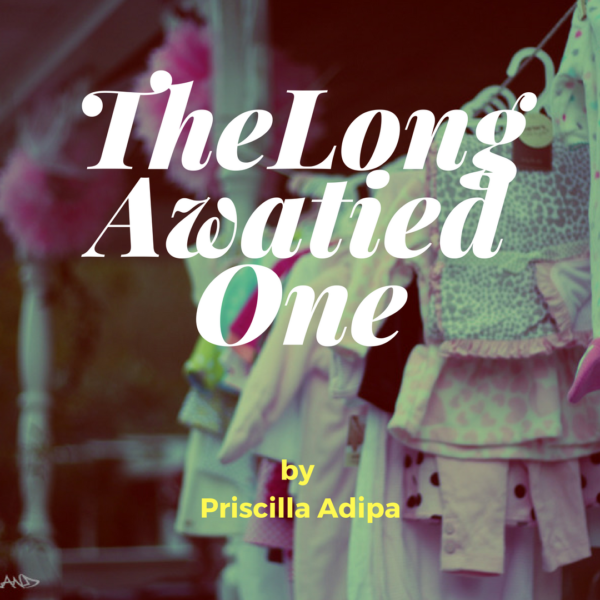
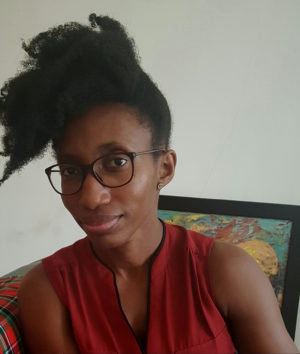

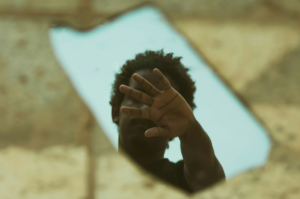
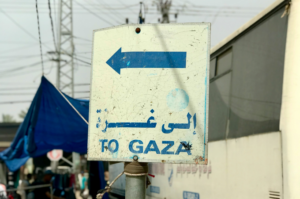
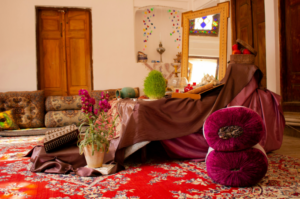
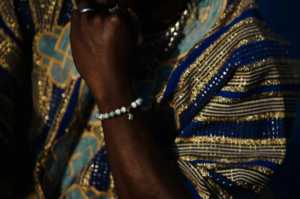
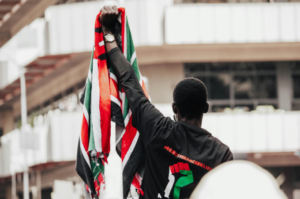

Alvin Allvin December 31, 2016 07:34
Many thanks for the details we were searching for this while we were scanning the web as well as your site showed up-- Many thanks